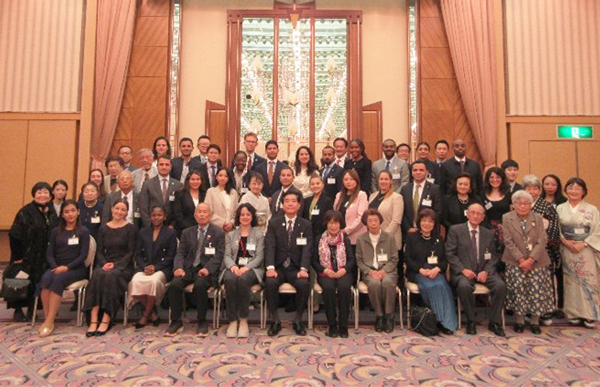UN Programme of Fellowships on Disarmament
The UN Disarmament Fellowship is a training program by the United Nations for young diplomats and others to train disarmament experts, especially in developing countries.
The decision to implement the program was made at the first session of the United Nations General Assembly on Disarmament in 1978.
Every year, program participants visit countries around the world, including Hiroshima and Nagasaki, and undertake training in the A-bombed cities to convey the inhumanity of nuclear weapons based on the experience of the atomic bombings.
Hiroshima hosted the 41st training program with 25 participants from 25 countries over a 3-day period.
On the first day of the training, Shiro Tani, Vice Chairperson of our Foundation, explained the widespread devastation caused by the atomic bombings in the context of the humanitarian consequences of nuclear weapons use, highlighting it as the foundation for humanitarian initiatives. Then Ms. Keiko Ogura gave a lecture on her A-bomb experience, and the participants visited the Peace Memorial Museum.
After the training on the first day, the participants had an opportunity to interact with hibakusha, councilors and executive officers and staff members of our Foundation. High school and university students who are Youth Peace Volunteers actively served as interpreters to bridge the conversation, and participants greatly deepened their friendships.
 On the second day, a VR tour was conducted to visually experience the reality of the atomic bombing.
The participants also toured the Atomic Bomb Dome, the Cenotaph, and other sites in Peace Memorial Park through the guidance of the Youth Peace Volunteers.
On the second day, a VR tour was conducted to visually experience the reality of the atomic bombing.
The participants also toured the Atomic Bomb Dome, the Cenotaph, and other sites in Peace Memorial Park through the guidance of the Youth Peace Volunteers.
On the final day, facilitated by Takehiro Kagawa, Chairperson of our Foundation, participants discussed the challenges of building a peaceful world and what they should work on in their respective capacities in the future after the training in Hiroshima.
Through this training, the participants commented that they were "heartbroken by the suffering experienced by the hibakusha," "gained a deeper understanding of the long-term and multifaceted effects of the atomic bombings," and "as a diplomat, I will continue to raise awareness of the importance of nuclear disarmament and work toward achieving a nuclear-weapon-free world."
It is very important to deepen interaction between young diplomats from various countries, who will be responsible for future security, and the younger generation in Hiroshima who are concerned about peace.
Hiroshima hosted the 41st training program with 25 participants from 25 countries over a 3-day period.
On the first day of the training, Shiro Tani, Vice Chairperson of our Foundation, explained the widespread devastation caused by the atomic bombings in the context of the humanitarian consequences of nuclear weapons use, highlighting it as the foundation for humanitarian initiatives. Then Ms. Keiko Ogura gave a lecture on her A-bomb experience, and the participants visited the Peace Memorial Museum.
After the training on the first day, the participants had an opportunity to interact with hibakusha, councilors and executive officers and staff members of our Foundation. High school and university students who are Youth Peace Volunteers actively served as interpreters to bridge the conversation, and participants greatly deepened their friendships.

Program participants, A-bomb survivors, and others
On the final day, facilitated by Takehiro Kagawa, Chairperson of our Foundation, participants discussed the challenges of building a peaceful world and what they should work on in their respective capacities in the future after the training in Hiroshima.
Through this training, the participants commented that they were "heartbroken by the suffering experienced by the hibakusha," "gained a deeper understanding of the long-term and multifaceted effects of the atomic bombings," and "as a diplomat, I will continue to raise awareness of the importance of nuclear disarmament and work toward achieving a nuclear-weapon-free world."
It is very important to deepen interaction between young diplomats from various countries, who will be responsible for future security, and the younger generation in Hiroshima who are concerned about peace.
(Public Collaboration for Peace Division)
Hiroshima Peace Culture Foundation
1-2 Nakajima-cho, Naka-ku, Hiroshima 730-0811 JAPAN
Phone 082-241-5246
Copyright © Since April 1, 2004, Hiroshima Peace Culture Foundation. All rights reserved.